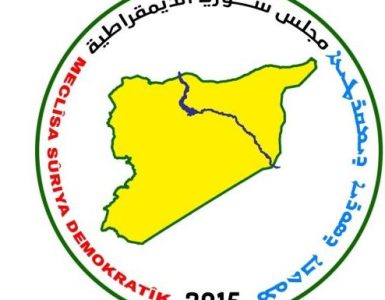On the occasion of the 20th anniversary of the March 12 Uprising and the 13th anniversary of the Syrian Revolution, the Relations Office of the Syrian Democratic Council (SDC) held a series of events and seminars under the slogan “The Syrian Unity is the Foundation for Solutions in Syria.” A wide audience attended the events and in various regions of Syria.
Layla Qaraman, Co-chairwoman of the SDC, chaired the forum held in Raqqa city on Mach 13. The forum was attended by Sheikhs, tribal leaders, intellectuals, politicians, human rights activists, representatives of civil institutions, and members of the Autonomous Administration of North and East Syria (AANES) as well as the Green Idlib Council.
Mustafa Othman, a member of the SDC’s Relations Office, welcomed the attendees and extended Ramadan greetings. Othman commemorated the two significant occasions and their interconnectedness. “We are here to commemorate meaningful milestones in our country’s history that are the March 12 Uprising in 2004 and the Syrian Revolution on March 15, 2011, ” Othman stated.
Amal Dada, Co-chairwoman of the SDC’s Relations Office, also participated in the forum. Dada talked about the first theme of the forum regarding the March 12 Uprising, its beginning, repercussions, and the circumstances that led to its pivotal role in the break out of the Syrian Revolution.
The forum ’s second theme focused on the anticipated tasks of the Syrian Revolution amidst the current political circumstances and developments. Qaraman emphasized that Syrian Kurdish individuals participated in the March 12 Uprising in Qamishli twenty years ago, overcoming the fear and aiming to achieve a political change in Syria.
Qaraman talked about the 13th anniversary of the Syrian Revolution. “We are committed to the approach of the true Revolution that resulted in the establishing of the AANES and the continued path for 13 years through the protests in Suwayda,” Qaraman stated.
Addressing the Turkish attacks on Syrian territories, Qaraman stated that the success of the democratic Syria lies in the unity of its people and their collective efforts against assaults.
Participants also highlighted attempts by the Syrian authorities to ignite discord between Arabs and Kurds at that time. However, the Syrian people’s cohesive awareness surpassed these attempts, as some sources recounted the incident and documented the regime’s crimes and martyrs.
In the city of Manbij, the SDC’s Relations Office held a dialogue seminar titled “Syrians’ Unity is the Basis for Political Solution” last week. The seminar was attended by sheikhs, tribal leaders, intellectuals, civil activists, and politicians.
Dada commenced the seminar with an evaluative overview of the revolutionary phase. She emphasized that the Kurdish uprising on March 13, 2004, was the starting point of the revolutionary movement initiated by the children of Daraa thirteen years ago.
Dada further affirmed that the SDC actively strives to reunite Syrians, liberate all occupied territories, and end the state of division in Syria.
On the other hand, Hassan Muhammad Ali, Co-chairman of the SDC’s Relations Office, talked about the Syrian Revolution. “The Syrian Revolution was a subsequent response to the Qamishli uprising, driven by internal and objective circumstances,” Muhammad Ali stated.
In a related context, Muhammad Ali emphasized that Syrians have learned from the mistakes occurred during the Revolution that should be as hope for all Syrians, leading the democratic transition.
The seminar also witnessed several participations focusing on social cohesion, achieving consensus, and changing the harsh reality of the Syrian people. It was affirmed that Syrians rely on the national cohesion and intra-Syrian dialogue.
Furthermore, the third seminar was held in the city of Qamishli, and attended by tribal figures, political activists, as well as representatives of political parties and civil society.
Amjad Othman, Deputy Co-chairman of the SDC, provided an analytical overview of the popular movement. This movement has spanned significant events, starting from the Kurdish uprising in March 2004, passing through the Syrian Revolution, and culminating in the recent protests in Suwayda, Idlib, and Afrin.
Othman emphasized that the unification of the outcomes of these uprisings is crucial for steering Syria back onto the correct path, despite opposing mindsets. He called upon all national powers to review and evaluate their stances and make bold decisions to resolve the Syrian issue.
Additionally, Hussein Azam, a member of the SDC’s Relations office, discussed the reasons behind the Syrian Revolution, its repercussions, and the key stages it has undergone. He also touched upon the international role and position regarding the Syrian Revolution.
“Despite the current challenging reality and the complexity of the political situation, it is incumbent upon all segments of Syrian society to work together. This collective effort is necessary to confront upcoming political challenges, which require essential and realistic changes across various domains. Strengthening the fundamental reasons for the success of collective and participatory work is crucial for implementing the values and goals of the Syrian revolution,” Azam stated.
Furthermore, Sawsan Rashid, Human rights advocate and researcher from the PEL Organization, shed light on the violations committed in areas occupied by Turkey. These discussions emphasize the importance of recognizing and valuing the rightful popular movement and believing in the intra-Syrian dialogue as a foundation for resolving the Syrian crisis and reclaiming occupied territories.



















